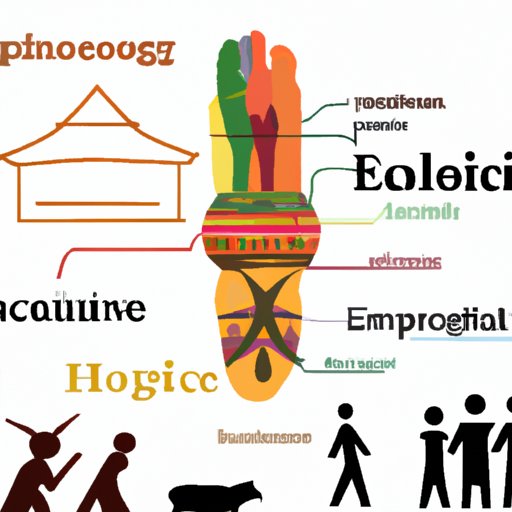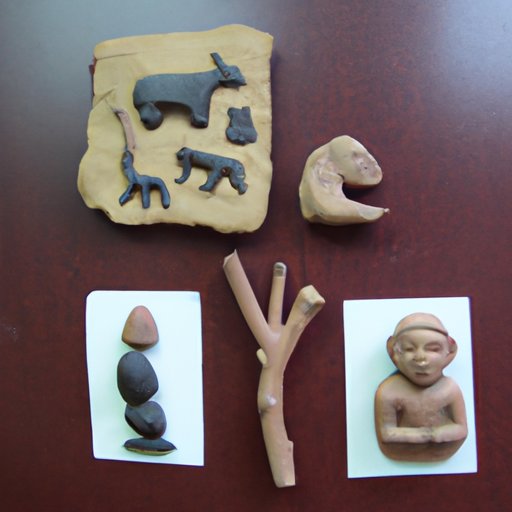Introduction
Anthropology is the study of humanity and its cultures, past and present. It is a holistic field of study, encompassing the biological, social, and cultural aspects of human life. Culture is an integral part of anthropology, as it is through culture that humans interact with their environment and construct meaning out of their experiences. This article will explore the role of culture in anthropology, looking at how cultural practices influence human behavior, examining cultures through an anthropological lens, and investigating the impact of cultural diversity on society.

Exploring the Role of Culture in Anthropology
Culture plays a crucial role in anthropology, as it provides a way for humans to make sense of the world around them. By understanding the cultural practices of different societies, anthropologists can gain insight into how individuals interact with their environment, as well as how they form and maintain relationships with one another. Through the study of culture, anthropologists can also uncover the evolutionary origins of certain behaviors and beliefs, allowing them to trace the development of human societies over time.
How Cultural Practices Influence Human Behavior
Cultural practices are often deeply embedded in the beliefs and values of a particular society, and they can have a profound influence on how individuals interact with their environment. For example, certain religious or spiritual beliefs may shape the way people view the natural world, while socioeconomic status can affect access to resources. By studying how different cultures perceive and interact with their environment, anthropologists can gain insight into how humans respond to their surroundings.
Examining Cultures Through an Anthropological Lens
Anthropologists use a variety of methods to study cultures, including participant observation, interviews, and surveys. Through these methods, anthropologists can learn about the beliefs and values of a given culture, as well as the ways in which people interact with each other and their environment. By understanding cultural practices from an outside perspective, anthropologists can gain insight into how different cultures interact with one another, and how those interactions shape the dynamics of society.

Investigating the Impact of Cultural Diversity on Society
Cultural diversity is an important factor in understanding the evolution of human societies. As cultures come into contact with one another, they often exchange ideas, beliefs, and practices, resulting in the emergence of new cultural forms. By studying the effects of cultural diversity on society, anthropologists can gain insight into how different cultures have interacted with one another over time, and how those interactions have shaped the development of human societies.

Understanding the Significance of Cultural Traditions
Cultural traditions are an important part of any society, as they provide a way for individuals to express their identity and connect with their heritage. By studying the significance of cultural traditions, anthropologists can gain insight into how different cultures have evolved over time, and how particular traditions may have shaped the development of certain societies. In addition, anthropologists can also examine how certain traditions may have been adapted or changed in order to meet the needs of a changing society.
Studying the Evolutionary Origins of Cultural Practices
By studying the evolutionary origins of cultural practices, anthropologists can gain insight into the development of human societies over time. For example, by studying the archaeological record, anthropologists can uncover evidence of how certain cultural practices may have emerged, and how they have changed over time. By examining the evolutionary origins of cultural practices, anthropologists can gain a better understanding of how different societies have interacted with one another, and how those interactions have impacted the development of human societies.
Conclusion
In conclusion, culture plays an important role in anthropology, as it provides a way for humans to make sense of their environment and construct meaning out of their experiences. By studying how cultural practices influence human behavior, examining cultures through an anthropological lens, and investigating the impact of cultural diversity on society, anthropologists can gain insight into the development of human societies over time. Culture is an essential part of anthropology, and it is through the study of culture that anthropologists can gain a better understanding of the complexities of human life.
(Note: Is this article not meeting your expectations? Do you have knowledge or insights to share? Unlock new opportunities and expand your reach by joining our authors team. Click Registration to join us and share your expertise with our readers.)
